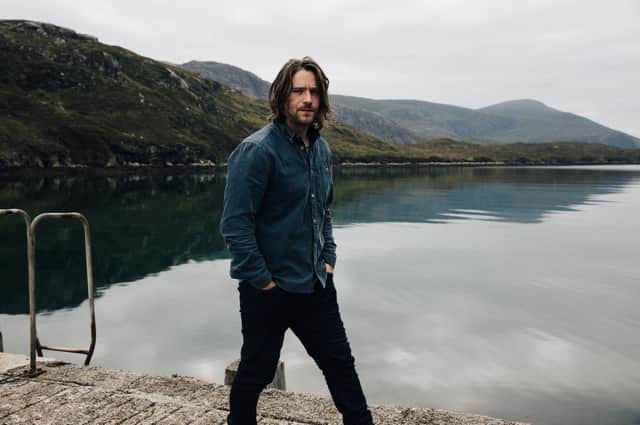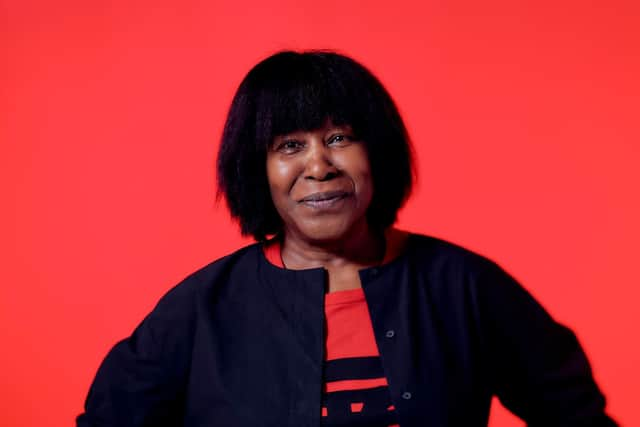Album reviews: Colin Macleod | Chris Connelly & Monica Queen | Marina | Joan Armatrading


Colin Macleod: Hold Fast (SO Recordings) ****
Chris Connelly & Monica Queen: The Birthday Poems (Jnana Records) ****
Marina: Ancient Dreams in a Modern Land (Atlantic Records) ***


Joan Armatrading: Consequences (BMG) ***
Advertisement
Hide AdAdvertisement
Hide AdHebridean musician Colin Macleod has been through the whole bright lights, big city, major record label mill (trading a decade ago as The Boy Who Trapped the Sun), but it was only on returning home to the Isle of Lewis and reconnecting to his family’s crofting heritage and to island lore on his 2018 album Bloodlines that he found wider recognition.
Subsequent touring with Roger Waters and Robert Plant has taught him something of scale, and follow-up album Hold Fast is at times as big, bold and beautiful as the Hebridean sky, a welcoming collection of Celtic Americana infused with the big-hearted spirit of Bruce Springsteen, Arcade Fire and others who specialise in sonic panoramas.
There is a widescreen romance to Queen of the Highlands, its simple brushstrokes of acoustic guitar, sighing strings and yearning vocals gradually expanding in scope, embellished by the twang of slide guitar.


Warning Signs, a cautionary tale of hazardous drinking, was made for blaring out of a radio and there is a natural scale to the huge, fuzzy, twanging guitars and Macleod’s lusty, cathartic vocals on the stirring Sleep.
But Macleod evokes the everyman emoting of Travis as much as the Big Music of The Waterboys with some gentle moments of intimacy, such as the wistful ache of 33, an acoustic country duet with Sheryl Crow, and the brief sample of Lewis psalm singing which rounds off Looking for God.
From Lewis to Orkney, to celebrate the life and work of poet George Mackay Brown in his centenary year. The Birthday Poems is a song cycle inspired by Brown’s romance with Stella Cartwright, aka the Muse of Rose Street, for whom he penned a birthday poem every year. Edinburgh-born, Chicago-based musician Chris Connelly (Finitribe/Minstry) summons Brown’s spirit on the rambunctious Tae the Poets, Glasgow siren Monica Queen (Thrum/Tenement and Temple) sings Stella to life with the plaintive power of My Father Took Me Everywhere, and the pair come together on the urgent A Minor Hoolie like a Caledonian Nick Cave and Anita Lane.
Acoustic rhythm guitar, electric piano, cinematic strings and soulful saxophone weave in and out of the soundtrack but there are also a handful of bare recitations such as the sepia Cigarettes at Dawn or Let Us Be Hushed, delivered against sombre piano chords and sighing strings. Using psychogeographic snapshots and elemental storytelling to build an elegant, exotic Edinburgh odyssey, The Birthday Poems is a surprise gift.


Advertisement
Hide AdAdvertisement
Hide AdThe peachy keen and slightly bonkers Marina returns to the pop fray with broad themes of discrimination on her mind, all couched in her trademark proggy electro pop terms. She cuts through the toxic climate on Purge the Poison, calls out cultural misogyny on Man’s World, noting how the terminology has shifted over the centuries from witch to b***h, and stokes her fascination with the US on the agreeably batty poperatic New America. When she’s not baring her teeth, she’s baring her heart via aching ballads Highly Emotional People and Goodbye, on which she strikes an idiosyncratic balance of earnest sincerity and eccentric melodrama.
In contrast to the flamboyant Marina, Joan Armatrading has been a quiet trailblazer for decades, writing mellow songs about high passion and female desire. Her latest album, Consequences, is more general celebration than personal confessional, kicking off with upbeat, soulful love ode Natural Rhythm, and building on the theme of romantic timing on Already There. The gently jaunty Better Life offers a catalogue of simple self-help cliches but, now more than ever, who would counter the advice to “remember how short a life is, plan how you will enjoy it”?
CLASSICAL
Shostakovich: Piano Concertos & Piano Trio No 2 (Linn) *****
There’s a chronological logic to this all-Shostakovich disc featuring the brilliant Simon Trpčeski on piano and the Janáček Philharmonic Orchestra under Cristian Macelaru. At either end are the two piano concertos: the first – which began life as a trumpet concerto – dating from 1933 and radiating virtuosic optimism, which Shostakovich himself conceived as a vehicle for his own pianistic prowess; the second, written in 1957 as a showpiece for his son, riven with skittish humour and mischief. Trpčeski embraces both works with dazzling wit and energy, but also rapt reflection in the slow movements. The real treasure lies in the Second Piano Trio of 1944, a work of searing pain and angst, and as such perfectly positioned between the concertos. Trpčeski is joined by violinist Aleksandar Krapovski and cellist Alexander Somov in a churning, brooding performance, with a finale which is brazen and edgy to the last. Ken Walton
JAZZ
Hal Galper Quintet: Live at the Berlin Philharmonic 1977 (Origin Records) ****
This intense moment in time captures US pianist Hal Galper leading a volatile quintet with the fabled Brecker brothers – trumpeter Randy and the late Mike on tenor saxophone, bassist Wayne Dockery and drummer Bob Moses. The double CD opens by establishing the band’s take-no-prisoners ethos with Now Hear This, Galper’s creative fire churning and spinning over the relentless pace of bass and drums while both Breckers are in incandescent form, soloing and in terse unison choruses. The 25-minute Speak With a Single Voice picks up the torch with a vengeance, things intensifying to volcanic levels. Meanwhile, the only cover is an expansive piano-sax exploration of the ballad I’ll Never Stop Loving You and a gospel joyousness to Hey Fool. At a time when straight ahead jazz was competing with fusion, this high-flying acoustic quintet generated a sizzling electricity of its own. Jim Gilchrist
A message from the Editor:
Thank you for reading this article. We're more reliant on your support than ever as the shift in consumer habits brought about by coronavirus impacts our advertisers.
If you haven't already, please consider supporting our trusted, fact-checked journalism by taking out a digital subscription at https://www.scotsman.com/subscriptions